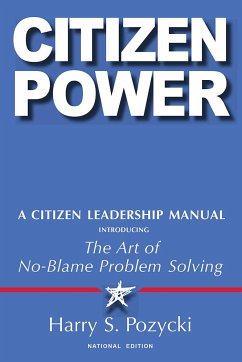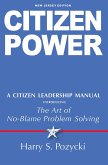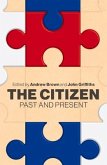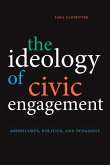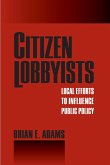Harry S Pozycki
Citizen Power
A Citizen Leadership Manual Introducing the Art of No-Blame Problem Solving
23,99 €
inkl. MwSt.
Versandfertig in über 4 Wochen

12 °P sammeln
Harry S Pozycki
Citizen Power
A Citizen Leadership Manual Introducing the Art of No-Blame Problem Solving
- Broschiertes Buch
- Merkliste
- Auf die Merkliste
- Bewerten Bewerten
- Teilen
- Produkt teilen
- Produkterinnerung
- Produkterinnerung
CITIZEN POWER gives all Americans the know how to become no-blame problem solvers and be part of what is emerging as a new model for a citizen driven national public service.
Andere Kunden interessierten sich auch für
![Citizen Power Citizen Power]() Harry S PozyckiCitizen Power23,99 €
Harry S PozyckiCitizen Power23,99 €![The Citizen The Citizen]() The Citizen33,99 €
The Citizen33,99 €![The Consumer Citizen The Consumer Citizen]() Ethan PorterThe Consumer Citizen35,99 €
Ethan PorterThe Consumer Citizen35,99 €![The Ideology of Civic Engagement The Ideology of Civic Engagement]() Sara CarpenterThe Ideology of Civic Engagement35,99 €
Sara CarpenterThe Ideology of Civic Engagement35,99 €![A Liberty Handbook: For the Common Citizen A Liberty Handbook: For the Common Citizen]() J. B. SalazarA Liberty Handbook: For the Common Citizen17,99 €
J. B. SalazarA Liberty Handbook: For the Common Citizen17,99 €![Azadi Azadi]() Arundhati RoyAzadi16,99 €
Arundhati RoyAzadi16,99 €![Citizen Lobbyists: Local Efforts to Influence Public Policy Citizen Lobbyists: Local Efforts to Influence Public Policy]() Brian AdamsCitizen Lobbyists: Local Efforts to Influence Public Policy31,99 €
Brian AdamsCitizen Lobbyists: Local Efforts to Influence Public Policy31,99 €-
-
-
CITIZEN POWER gives all Americans the know how to become no-blame problem solvers and be part of what is emerging as a new model for a citizen driven national public service.
Hinweis: Dieser Artikel kann nur an eine deutsche Lieferadresse ausgeliefert werden.
Hinweis: Dieser Artikel kann nur an eine deutsche Lieferadresse ausgeliefert werden.
Produktdetails
- Produktdetails
- Verlag: Rutgers University Press
- First Edition, First Edition, National edition
- Seitenzahl: 168
- Erscheinungstermin: 6. März 2020
- Englisch
- Abmessung: 226mm x 152mm x 13mm
- Gewicht: 408g
- ISBN-13: 9781978820739
- ISBN-10: 1978820739
- Artikelnr.: 59945568
- Herstellerkennzeichnung
- Libri GmbH
- Europaallee 1
- 36244 Bad Hersfeld
- gpsr@libri.de
- Verlag: Rutgers University Press
- First Edition, First Edition, National edition
- Seitenzahl: 168
- Erscheinungstermin: 6. März 2020
- Englisch
- Abmessung: 226mm x 152mm x 13mm
- Gewicht: 408g
- ISBN-13: 9781978820739
- ISBN-10: 1978820739
- Artikelnr.: 59945568
- Herstellerkennzeichnung
- Libri GmbH
- Europaallee 1
- 36244 Bad Hersfeld
- gpsr@libri.de
HARRY POZYCKI is the Chairman and Founder of The Citizens Campaign, a non-partisan organization dedicated to bringing a solutions focus to our government and to restoring service, civility, and pragmatism to our political culture. Working as a full-time volunteer, with the help of former Harvard President, Derek Bok, and other Citizens Campaign board members, Harry assembled a team of government law experts and distinguished former government leaders. Together, they developed a “power platform” that teaches citizens evidence-based, public issue solving with a “no blame” strategy. Expanding the reach and impact of citizen power, Harry then developed a program for creating community based Civic Trusts, where citizens, trained in no-blame problem solving, serve as Civic Trustees. Meeting in monthly “Solution Sessions,” Civic Trustees work together to find practical solutions to the challenges facing their cities and our country. In partnership with the University of Pennsylvania’s Graduate School of Education, Harry also developed a high school curriculum known as Power Civics, and later an advanced college version. Combining the citizen leadership training of Power Civics with the public service opportunity of Civic Trusts, Harry recently launched the “Civic City” initiative, with a goal of expanding the problem-solving capacity of cities and, via sharing local solutions nationwide, the country. For his substantial work and contributions in the civic arena, Harry received the New Jersey Governor’s Jefferson Award for Civic Innovation and was recognized by the Philadelphia Inquirer as its Citizen of the Year. In 2001, Harry brought all sides together to pass New Jersey’s Open Public Records Act, which gives citizens access to government information so they can initiate constructive solutions without waiting for the political establishment. He was also the lead author of the Citizen Service Act and the Party Democracy Act, state laws which open up opportunities for citizens to serve in appointed government leadership posts and grassroots political party leadership roles. For this work, Harry received a Doctor of Humane Letters from Monmouth University. In 1992, Harry led a bottom up reform fight and took over the chairmanship of what was then the most powerful political party organization in New Jersey, transferring the power over party endorsements to grassroots representatives. In 1995, Harry was elected to a county government position with executive and legislative power serving 750,000 residents. In this role, he authored and implemented a “Code of Conduct” requiring competitive hiring practices and competitive leasing contracts. To further ensure the integrity of government contracting on a statewide basis, Harry went on to lead the development and passage of what the New York Times reported was the strongest Pay-to-Play reform law in the nation. Harry is a 1969 graduate of Brown University and holds a law degree from Fordham Law School. In 1973, he founded a law firm specializing in growth planning and environmental law. He co-authored an encyclopedia of Land Use Law in 1985 (West Publishing Co.) and served as chairman of the committee that developed and passed New Jersey’s Fair Housing Act. He is also credited by former Governor Tom Kean for his leadership in developing and gaining passage of the State Planning Act. Harry and his wife, Caroline, and their two daughters and sons-in-law, reside in Perth Amboy, New Jersey.
Cover
Title
Copyright
Contents
Dedication
Author's Note
Acknowledgement
Introduction
Chapter One. The 4 Power Centers: Prime Decision-Making Arenas of Local
Government
THE LOCAL GOVERNING BODY (Mayor & Council) and Your Legal Rights to
Participate in Decision-Making
THE SCHOOL BOARD and Your Legal Rights to Participate in Decision-Making
THE PLANNING BOARD and Your Legal Rights to Participate in Decision-Making
THE LOCAL POLITICAL PARTY and Your Legal Rights to Participate in
Decision-Making
Chapter Two. Citizen Power in the 21st Century Expanded citizen problem
solving power through advances in technology
Expanded citizen rights to participate in government decision-making
Accessing current policy details (OPRA-the Open Public Records Act)
Introducing your solutions OPMA-the Open Public Meetings Act
Chapter Three. The Power of Practical Solutions: The 3 principles of
pragmatic problem solving
Solutions should be based on evidence of success
Solutions should be cost-effective
Solutions should be beneficial to the community as a whole
Chapter Four. The Power of the No-Blame Approach Chapter Five. Using the
Strategy of no Blame Problem Solving
Identifying Your Issue and Finding Solutions
Adapting Your Solution to Make It "Doable"
Presenting Your Solution For Adoption
Respectful Pursuit to Implementation of Your Solution
Chapter Six. The No-Blame Problem Solving Guide
The Key Steps
Chapter Seven. Media Literacy in the Search For Solutions
Chapter Eight. Powerful Roles for Citizen Problem Solvers
Serving as a Civic Trustee
Serving as a Solutions Advocate
Serving in an Appointed Government Office Serving as a Neighborhood
Political Party Representative
Chapter Nine. The Civic Trust
Civic Trusts. A Great Opportunity to Serve your Community and your Country
Note to Non Citizens
About the Author
Civic Trustee Handbook
Back Cover
Title
Copyright
Contents
Dedication
Author's Note
Acknowledgement
Introduction
Chapter One. The 4 Power Centers: Prime Decision-Making Arenas of Local
Government
THE LOCAL GOVERNING BODY (Mayor & Council) and Your Legal Rights to
Participate in Decision-Making
THE SCHOOL BOARD and Your Legal Rights to Participate in Decision-Making
THE PLANNING BOARD and Your Legal Rights to Participate in Decision-Making
THE LOCAL POLITICAL PARTY and Your Legal Rights to Participate in
Decision-Making
Chapter Two. Citizen Power in the 21st Century Expanded citizen problem
solving power through advances in technology
Expanded citizen rights to participate in government decision-making
Accessing current policy details (OPRA-the Open Public Records Act)
Introducing your solutions OPMA-the Open Public Meetings Act
Chapter Three. The Power of Practical Solutions: The 3 principles of
pragmatic problem solving
Solutions should be based on evidence of success
Solutions should be cost-effective
Solutions should be beneficial to the community as a whole
Chapter Four. The Power of the No-Blame Approach Chapter Five. Using the
Strategy of no Blame Problem Solving
Identifying Your Issue and Finding Solutions
Adapting Your Solution to Make It "Doable"
Presenting Your Solution For Adoption
Respectful Pursuit to Implementation of Your Solution
Chapter Six. The No-Blame Problem Solving Guide
The Key Steps
Chapter Seven. Media Literacy in the Search For Solutions
Chapter Eight. Powerful Roles for Citizen Problem Solvers
Serving as a Civic Trustee
Serving as a Solutions Advocate
Serving in an Appointed Government Office Serving as a Neighborhood
Political Party Representative
Chapter Nine. The Civic Trust
Civic Trusts. A Great Opportunity to Serve your Community and your Country
Note to Non Citizens
About the Author
Civic Trustee Handbook
Back Cover
Cover
Title
Copyright
Contents
Dedication
Author's Note
Acknowledgement
Introduction
Chapter One. The 4 Power Centers: Prime Decision-Making Arenas of Local
Government
THE LOCAL GOVERNING BODY (Mayor & Council) and Your Legal Rights to
Participate in Decision-Making
THE SCHOOL BOARD and Your Legal Rights to Participate in Decision-Making
THE PLANNING BOARD and Your Legal Rights to Participate in Decision-Making
THE LOCAL POLITICAL PARTY and Your Legal Rights to Participate in
Decision-Making
Chapter Two. Citizen Power in the 21st Century Expanded citizen problem
solving power through advances in technology
Expanded citizen rights to participate in government decision-making
Accessing current policy details (OPRA-the Open Public Records Act)
Introducing your solutions OPMA-the Open Public Meetings Act
Chapter Three. The Power of Practical Solutions: The 3 principles of
pragmatic problem solving
Solutions should be based on evidence of success
Solutions should be cost-effective
Solutions should be beneficial to the community as a whole
Chapter Four. The Power of the No-Blame Approach Chapter Five. Using the
Strategy of no Blame Problem Solving
Identifying Your Issue and Finding Solutions
Adapting Your Solution to Make It "Doable"
Presenting Your Solution For Adoption
Respectful Pursuit to Implementation of Your Solution
Chapter Six. The No-Blame Problem Solving Guide
The Key Steps
Chapter Seven. Media Literacy in the Search For Solutions
Chapter Eight. Powerful Roles for Citizen Problem Solvers
Serving as a Civic Trustee
Serving as a Solutions Advocate
Serving in an Appointed Government Office Serving as a Neighborhood
Political Party Representative
Chapter Nine. The Civic Trust
Civic Trusts. A Great Opportunity to Serve your Community and your Country
Note to Non Citizens
About the Author
Civic Trustee Handbook
Back Cover
Title
Copyright
Contents
Dedication
Author's Note
Acknowledgement
Introduction
Chapter One. The 4 Power Centers: Prime Decision-Making Arenas of Local
Government
THE LOCAL GOVERNING BODY (Mayor & Council) and Your Legal Rights to
Participate in Decision-Making
THE SCHOOL BOARD and Your Legal Rights to Participate in Decision-Making
THE PLANNING BOARD and Your Legal Rights to Participate in Decision-Making
THE LOCAL POLITICAL PARTY and Your Legal Rights to Participate in
Decision-Making
Chapter Two. Citizen Power in the 21st Century Expanded citizen problem
solving power through advances in technology
Expanded citizen rights to participate in government decision-making
Accessing current policy details (OPRA-the Open Public Records Act)
Introducing your solutions OPMA-the Open Public Meetings Act
Chapter Three. The Power of Practical Solutions: The 3 principles of
pragmatic problem solving
Solutions should be based on evidence of success
Solutions should be cost-effective
Solutions should be beneficial to the community as a whole
Chapter Four. The Power of the No-Blame Approach Chapter Five. Using the
Strategy of no Blame Problem Solving
Identifying Your Issue and Finding Solutions
Adapting Your Solution to Make It "Doable"
Presenting Your Solution For Adoption
Respectful Pursuit to Implementation of Your Solution
Chapter Six. The No-Blame Problem Solving Guide
The Key Steps
Chapter Seven. Media Literacy in the Search For Solutions
Chapter Eight. Powerful Roles for Citizen Problem Solvers
Serving as a Civic Trustee
Serving as a Solutions Advocate
Serving in an Appointed Government Office Serving as a Neighborhood
Political Party Representative
Chapter Nine. The Civic Trust
Civic Trusts. A Great Opportunity to Serve your Community and your Country
Note to Non Citizens
About the Author
Civic Trustee Handbook
Back Cover
